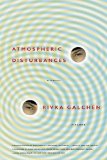Reading Guide Questions

Please be aware that this discussion guide will contain spoilers!
Introduction
Hailed as a virtuosa storyteller, garnering comparisons ranging from Borges to
Murakami, Rivka Galchen has received a level of ebullient acclaim rarely bestowed
on debut novelists. Exploring the nature of love, identity, truth, and reality itself,
Atmospheric Disturbances is equally funny and fantastical, yet grounded in colorful
details capturing the conflicts of daily life.
At the heart of these quandaries is Dr. Leo Liebenstein, his missing wife, Rema, and
his psychiatric patient Harvey. The only clue Rema has left behind is an illusion of
herself, a cunning simulacra that looks, talks, and behaves just like the real Rema
and has fooled everyone but Leo. Attempting to unravel the mystery of spousal
replacement, he embarks on an investigation that leads him to the inner sanctum of
the Royal Academy of Meteorology in their cosmic conflict with the 49 Quantum
Fathers, and the unwelcome conviction that somehow he—or maybe his wife, or
maybe even Harvey—lies at the center of these unfathomable developments. From
Buenos Aires to Manhattan, with many cosmic sojourns in between, Leo’s erratic
quest yields both a suspenseful psychological thriller and a moving love story.
Inventive and provocative, Atmospheric Disturbances deftly explores the nature of
human relationships, and how we spend our lives trying to weather the storms of
our own making.
Questions for Discussion
- Discuss the novel’s epigraphs. Does your own experience with love and friendship
match the observations of the French philosopher Gilles Deleuze? What is the effect
of reading a quote from the “real” Tzvi Gal-Chen, followed by scenes of a fictional
character who bears his name? How do Gal-Chen’s thoughts on prediction and
knowledge predict various outcomes in the novel?
- How much did you trust Leo as a narrator? What did you initially think the
novel’s mysteries were? How did you interpret the various clues provided by the
characters?
- What symptoms does Harvey have in common with his healers? How did Rema’s
scheme, coaching Leo through his impersonation, affect the mental health of the
other characters?
- What makes meteorology an ideal metaphor for love and marriage?
- On page 14, Leo describes the limits of reality testing for some patients. How do
the novel’s characters distinguish between reality and illusion? How do most of us
test reality—in love, at work, in politics?
- In what ways does Leo’s “Dopplerganger effect” (emphasized in Chapters 8 and
9) prove to be both true and absurd?
- Consider Rema’s puppy. What role does it play in propelling the storyline?
- How does the situation change when Leo meets Magda? What effect do she and
Anatole have on Rema? Ultimately, does anyone know Rema better than she knows
herself?
- On page 157, Leo describes the significance of the interpretive leap. How did you
interpret the sign at the bottom of the page? How do the novel’s characters balance
their interpretive leaps with empirical laws?
- In what way do the desaparecidos, the vanished victims of Argentina’s “dirty
war,” form a meaningful part of Leo’s travels in South America?
- What shifts occur when the setting changes to Buenos Aires? What keeps Leo
oriented in both New York and Argentina?
- How was your reading affected by the photographs that appear on pages 26 and
147? Can photography capture fiction?
- What criteria would your family and friends use if they were trying to determine
whether you were the real You or an impostor?
- Rivka Galchen weaves many philosophical references into the novel, ranging
from the term “simulacra” itself to critical theorists of the Frankfurt School (such
as Theodor Adorno) to poststructuralist theory (such as Jacques Lacan’s mirror
stage). Yet she was also hailed by the novelist Francisco Goldman for producing a
novel that is “as funny as any episode of The Simpsons.” What techniques enable her
to achieve such a broad range of tones? Is this novel a spoof? A tragedy? A realistic
account of a fracturing mind? A fable? How does the genre affect your reading of
the story?
- Chapter 22 is written almost entirely in the future tense. How does this affect
your reading of the closing scenes? What do you predict for the characters’ futures?
Unless otherwise stated, this discussion guide is reprinted with the permission of Picador.
Any page references refer to a USA edition of the book, usually the trade paperback version, and may vary in other editions.

 Book Reviewed by:
Book Reviewed by:





